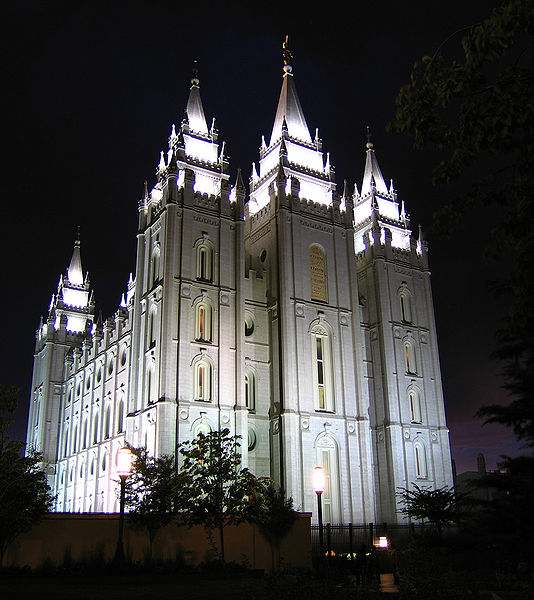Last month, a federal judge in Utah ruled that it violated the Constitution’s guarantee of equal protection to deny civil marriage rights to same-sex couples. After a few days of joyful chaos in which gay and lesbian couples flocked to county clerks’ offices, Utah state officials managed to convince the Supreme Court to temporarily stay the ruling pending a full hearing by an appeals court. In the meantime, the state announced that they’ll refuse to recognize the more than 1,000 marriages their own clerks had already solemnized.
The initial court decision gave rise to a circus of religious fundamentalist opposition, including one bigot who announced he was going on a hunger strike until Utah state officials agreed to defy the federal courts and the Constitution. (Since same-sex marriages have ceased for now, but in accordance with the regular judicial process, shouldn’t he still be starving himself?) More frighteningly, a group of conservative sheriffs called for “an uprising” against the ruling.
But even as Mormon beliefs were fueling all this impassioned opposition to the progress of human rights, something remarkable happened. The same month that this was going on, the LDS church quietly posted an essay to its official doctrinal website directly addressing its past complicity in racism:
Today, the Church disavows the theories advanced in the past that black skin is a sign of divine disfavor or curse, or that it reflects actions in premortal life; that mixed-race marriages are a sin; or that blacks are or people of any other race or ethnicity are inferior in any way to anyone else. Church leaders today unequivocally condemn all racism, past and present, in any form.
Until 1978, the LDS church explicitly barred people of color from being ordained into its priesthood (which is actually more like a confirmation or a bar mitzvah), or even entering its temples. There were various doctrinal explanations for this racism: one was that black people were the descendants of Cain (or Ham), and dark skin was a sign of the hereditary curse on that lineage. Another was that black people were the human spirits who were “less valiant” in the heavenly war against Satan that Mormons believe happened in the “pre-existence”. There are also verses in the Book of Mormon in which God curses sinners by turning their skin black (which makes them “loathsome” to all good, fair-skinned people), and forbids interracial marriage with those so cursed:
“And he had caused the cursing to come upon them, yea, even a sore cursing, because of their iniquity. For behold, they had hardened their hearts against him, that they had become like unto a flint; wherefore, as they were white, and exceedingly fair and delightsome, that they might not be enticing unto my people the Lord God did cause a skin of blackness to come upon them.
And thus saith the Lord God: I will cause that they shall be loathsome unto thy people, save they shall repent of their iniquities.
And cursed shall be the seed of him that mixeth with their seed; for they shall be cursed even with the same cursing. And the Lord spake it, and it was done.”
—2 Nephi 5:21-23
But as I said, these racist rules were repealed in 1978, supposedly in response to a divine revelation to church leadership. Ever since then, there have been sporadic calls for a formal repudiation, and that’s what the December announcement seems to be.
So, one of the very rare occasions where I’ll offer unqualified praise to a religious organization: the LDS church did the right thing by repudiating the racism of its founders. Granted, this may have been a strategic move to increase Mormonism’s appeal in countries where people of color are the majority; but even if it’s the politic thing to do, it’s still the right one. It’s very rare for a church to admit its past errors as openly as this, which makes this statement all the more praiseworthy.
The problem, though, is that the church leadership clearly hasn’t learned a lesson from this mistake. In their rigid opposition to marriage equality, they’re committing the same error all over again: reinforcing popular prejudice by lending it the authority of dogma, invoking religious beliefs as justification for treating one group of people as less human, less deserving of equal rights than others. Although they acknowledged their past wrong, they’re still acting as if it were a unique, sui generis moral failing, and refusing to see the modern parallel unfolding before their eyes.
Whether it’s their resistance to the Utah ruling, or their support for Proposition 8 in California, or their ongoing anti-gay lobbying throughout the U.S., the LDS church has once again placed itself on the wrong side of history, and will once again have to answer for it, probably sooner than they think. As I said, it’s praiseworthy of them to repudiate their past errors. But it would be far better if their contrition wasn’t strictly backward-looking; if they could draw a lesson from it that guides their future actions, and stop defending invidious bigotry no matter what form it may take.
Image credit: Ricardo630, released under CC BY-SA 2.5 license; via Wikimedia Commons
